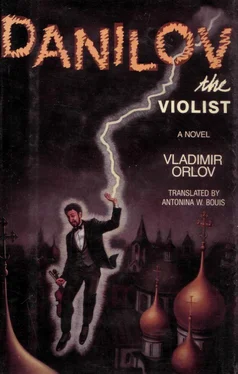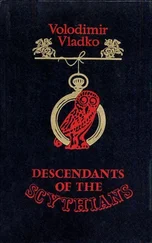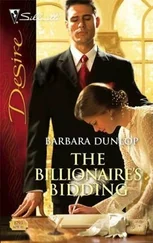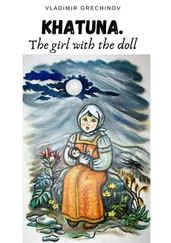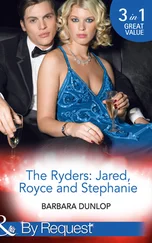"And what did you write to the queen of Belgium?"
"That's our secret," Klavdia said severely.
"Well, I'm off," Danilov said and stood up. He was angry.
In the next room, a botde fell.
"Forgive me," Klavdia begged. "I wasn't lying to you yesterday. I really did feel horrible."
She burst into tears.
Danilov watched Klavdia warily -- was this another trap? He knew what Klavdia's eyes and lips looked like when she was lying. No -- this suffering was real.
"I was so sick of it, I didn't want to go on living... I need you!"
"Did something happen?"
"Nothing... Just... You wear yourself out, and what for? It's all so petty ... empty! Danilov, I wish I could just live simply and for something and with someone faithful by my side! Like you!"
Danilov was touched. "This happens to everyone," he said.
"You're depressed, that's all... You have to go on living.
Your future has great promise..."
"What?" Klavdia asked nervously.
The tears had already dried on her cheeks.
"What," Danilov said carefully, "you know better than I ... or the futecons do ... and you have your main idea ... the ... crazy one..."
"Is it realizable?"
"I don't know ... I don't know what the idea is. I don't know what the futecons have forecast for you twenty years from now."
"Independence!" Klavdia said hotly. "That's my main idea!"
"Independence from what? From whom?"
"Simply Independence! Independence with a capital I!"
"Well, really ..." Danilov was stumped. What else could he say?
Klavdia was still melancholy, but there was energy in her eyes again. That meant she had gotten over her night terrors. Definitely, since she was writing letters to the queen of Belgium. Her tears must have been the mere vestiges.
"Danilov, I have such energy, such desire! If only you knew! But it's all wasted ... it might all peter out... but I could ... maybe I may manage a thing or two..."
"Did the futecons forecast independence for you?
"Yes."
"The futecons are serious people?"
"They are very serious people."
"I can tell that," Danilov said with a sigh.
"Why are you bringing them up? You haven't given them any trouble, have you?"
"Not yet."
"Don't even think of getting in their way. They'll crush you!"
"Don't worry."
"And if they invite you to join the line, accept immediately!"
"Why?"
"There are people in line from your orchestra. They know why."
"Like who?"
Danilov wanted Klavdia to mention the violist Chekhonin. And she did. And according to her, the cellist Turukanov and one of the conductors, whose name she didn't remember.
"I have to think it over," Danilov said.
"There's nothing to think about! At least you'll be able to help me!"
"Where am I supposed to get the dues money?"
"You can get an extra job!"
Danilov didn't intend to get into any line! He should be talking with Pereslegin and Chudetsky, and here he was idly chatting with Klavdia. She really knew how to get him! And he kept coming back! Did he really need to see her? Was that it? Yet she never mentioned his worries or his music. Maybe that was for the better, because he forgot his music for a bit when he was with Klavdia? "I don't know," Danilov said to himself. "I don't know." But it was about time he did.
"Is that gold?" Danilov asked about a locket hanging from a nail under a portrait.
"Gold," Klavdia said. "Luckily, I have friends who can give me presents like that."
There was reproach in her words, but Danilov didn't care. He started for the door, but Klavdia took the locket from the nail, opened it, and handed it to Danilov. Inside was a photo of the parrot from Rostovtsov's shoulder, and a lock of hair -- definitely Rostovtsov's, too.
In the next room a bottle fell and rolled on the floor.
Klavdia walked Danilov to the door. She suddenly noted:
"Damn! I forgot to make you take off your shoes! You've tracked up the floor! Next time take them off as soon as you come in!"
Danilov looked at the floor and didn't see any tracks. "Take them off, sure! What kind of a fool do you think I am? That's how Voinov is going to get his shoelaces."
28
It looked as if Danilov had stopped annoying Pereslegin. And Chudetsky actually said something nice to him once.
Danilov was playing better. He was less tormented by his imperfections. The Palace of Electrical Workers wholeheartedly gave itself up to the ballroom dancing contest, and Chu-detsky's youth orchestra moved to the House of Culture of Medical Workers.
But something else came over Danilov. He began having fears -- that something would get in the way. Not the fute-cons. Or Time X. He never even thought about Time X anymore. Now he feared that he would have an accident or die on the eve of the performance. He laughed at such fears, but with nervous laughter.
Suddenly Danilov became sad and distracted. Chudetsky and Pereslegin were worried.
"What's the matter, Vladimir Alekseyevich?" Chudetsky asked. "Everything was going so well, and now ... our premiere is the day after tomorrow, after all..."
Danilov's viola and bow were literally falling out of his hands.
"I'm tired," Danilov said.
At his own theater, he played the show, and went home to Ostankino. In the shadows near his house he saw Natasha:
"Hello," Natasha said. "I must talk to you. Even if you find talking to me a burden, I still ask that you hear me out..."
"It's cold out here," Danilov said.
They went up to his apartment.
"Volodya," Natasha said, "you may think that I'm forcing myself on you as a friend or lover. You can despise me, it won't change a thing. I could not go on without seeing you and talking it out. I'm not ashamed of coming."
Danilov was silent.
"I don't know whether or not you need me," Natasha said, "but if you don't love me, tell me, and I'll leave."
"What's the matter with me?" thought Danilov. "I'm being so petty."
"Do you need me?" Natasha asked.
"Yes," Danilov said.
"I have no one else."
"Forgive me for my hurtful words and for neglecting you ... but my whole life is up in the air."
"I know what music means to you. I can't be on an equal footing there with you, but I'll try to keep from being a burden for you. I'll do everything I can not to interfere in your music. Don't think I'm going to be nothing but a shadow or a slave -- that would bore you. I won't give up my own life, but I'll be your love and support."
"Thank you, Natasha," Danilov said.
"Just believe my words."
Now Danilov knew for certain that he should part with Natasha forever. He had to protect her from his own fate. But Danilov did not utter a word. And even if he had -- could he have changed anything? Now Natasha was stronger than he.
29
The day of the performance arrived.
Natasha ironed Danilov's tails and trousers; he ironed his black bow tie himself. Danilov couldn't eat a thing. He drank coffee.
Pereslegin called and asked nervously if Danilov had gotten a day off from the theater. Chudetsky was also nervous, and called to suggest that Danilov have his friends come to the club so that it wouldn't be empty.
Yesterday had been full of hassles, and today would be, too. Just as in the theater, when everyone thinks that nothing is ready, if they only had a day or two more, the actors are bad, the scenery is falling apart, and it's certain to be a disaster. But Danilov thrived on such hassles. He would rehearse, rush off somewhere, argue, fight, despair for an instant -- "Ah, the hell with it all!" -- then play some more, polish his shoes, trim his beard, call his friends, talk them out of buying flowers. Impatience scorched Danilov. He was cheery, energetic.
Читать дальше
